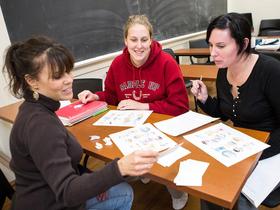Many teenagers look forward to finishing high school and beginning college as the time when they can finally escape their parents. But for an increasing number of American families, the start of a teenager’s college career is coinciding with a parent’s return to the classroom. For these families, attending college becomes a multi-generational affair.
While some teenagers might cringe at the idea of being in a class alongside a parent, others are finding that sharing the experience of community college with Mom or Dad provides unexpected benefits alongside its inevitable challenges.
Why Parents and Children are Increasingly Attending Community College Together
A recent Chicago Tribune article notes that the increase in parents and students who are sharing the same community college campus is a result of two social forces:
- The recession is driving many working adults to return to school to pursue a new degree. According to the Tribune, Illinois’s Harper Community College has seen the population of adult students jump by 17.5 percent this semester from spring 2009.
- Tighter family budgets are causing more high school graduates to start taking courses at more affordable community colleges rather than going immediately to a more expensive four-year college or university.
This video offers tips for parents going back to college.
The Benefits of Parents Becoming Students Themselves
Parents who attend community college along with their adolescent children often find unexpected benefits.



























